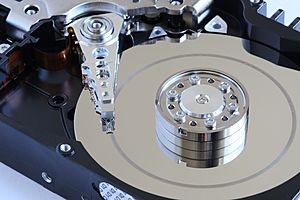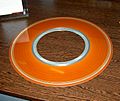Head crash facts for kids
A head crash happens inside a computer's hard drive. Imagine a tiny arm with a reading and writing tool, called the "head," floating just above a spinning disc. Normally, there's a tiny cushion of air keeping the head from touching the disc. A head crash is when this head accidentally scrapes or crashes into the disc. This can cause serious damage to the hard drive and the information stored on it.
Contents
Understanding Hard Drives
A hard drive is like the long-term memory of your computer. It stores all your files, programs, and the operating system. Inside, there are several shiny, magnetic discs stacked on top of each other. These discs spin very fast, sometimes thousands of times per minute. The "head" reads and writes data onto these spinning discs. It floats incredibly close to the surface, but usually never touches it.
How a Head Crash Happens
Head crashes are often caused by tiny particles like dust or dirt getting inside the hard drive. Even a tiny speck can be huge compared to the microscopic gap between the head and the disc. If one of these particles gets in the way, the head can hit it and then crash onto the disc.
Other things can also cause a head crash:
- Shocks or drops: If a laptop or external hard drive is dropped, the sudden movement can make the head bounce and hit the disc.
- Manufacturing defects: Sometimes, a hard drive might have a tiny flaw from when it was made, making it more likely to crash.
- Wear and tear: Over a very long time, parts inside the drive can wear out, leading to problems.
Signs of a Head Crash
When a head crash happens, you might notice some clear signs. The most common one is unusual noises coming from your computer or hard drive. These sounds can include:
- Clicking or ticking sounds
- Grinding or scraping noises
- Loud beeping or buzzing
Your computer might also freeze, slow down, or stop recognizing the hard drive completely. If you hear these sounds, it's a strong warning sign that something is wrong.
Protecting Your Data
A head crash can make it impossible to get your files back. This is why it's super important to regularly back up your data. Backing up means making copies of your important files and storing them somewhere else, like on an external hard drive, a USB stick, or in cloud storage (online storage).
If you back up your files often, even if your hard drive crashes, you won't lose your precious photos, videos, school projects, or games.
Related pages
Images for kids
See also
 In Spanish: Impacto de cabezales para niños
In Spanish: Impacto de cabezales para niños




